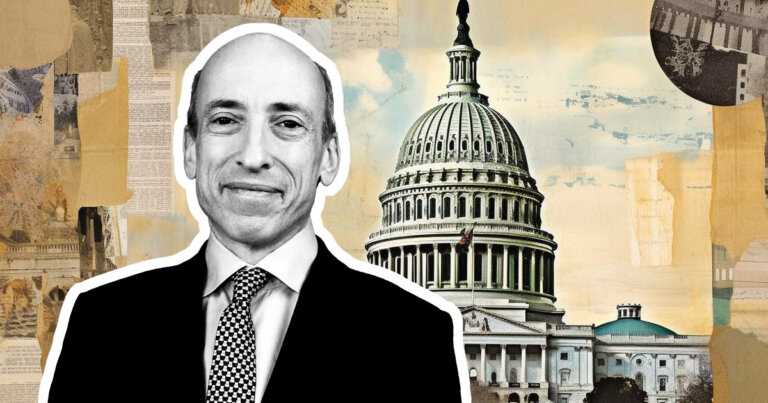 Blockchain Association calls for Gensler’s recusal from crypto enforcement decisions
Blockchain Association calls for Gensler’s recusal from crypto enforcement decisions Blockchain Association calls for Gensler’s recusal from crypto enforcement decisions
Blockchain Association senior counsel Marisa Coppel contends that SEC Chair Gary Gensler has already compromised his impartiality on crypto enforcement.

Cover art/illustration via CryptoSlate. Image includes combined content which may include AI-generated content.
The Blockchain Association is calling for SEC chair Gary Gensler to recuse himself from regulatory proceedings, claiming he demonstrates “clear bias” against the industry.
Senior counsel Marisa Coppel wrote today that Gensler’s statements proclaiming all cryptocurrencies besides Bitcoin to be securities show that he has “prejudged the facts” without adequately assessing the evidence and data, going so far past to say, “Chair Gensler’s goal is to make crypto illegal in America.”
She argued that this is made evident by the SEC’s recent enforcement action against an established crypto company like Coinbase despite the industry’s repeated requests for guidance and clarity.
Coppel said that the SEC has “abandoned its role as a rulemaking body” and refused to give the industry the clarity it needs around securities laws and how they apply to different products and services within the sector. Instead, the regulator has chosen to go into “enforcement overdrive.”
She wrote:
“With such clear bias, and such dereliction of the basic tenets of due process, the agency cannot fairly supervise the digital assets industry.”
Violation of due process
Coppel argues that the SEC’s decision to initiate enforcement action against Coinbase demonstrates a violation of due process by Gary Gensler. This alleged violation pertains to the so-called Wells process, which mandates that a company targeted by an enforcement action must be informed of the claimed violation and afforded an opportunity to respond to the allegations.
Upon the conclusion of the Wells process, a vote by the SEC Commissioners determines whether or not enforcement action will be pursued. It is essential, according to Coppel, that the Commissioners, in making this decision, do so without any semblance of bias.
Nevertheless, Coppel contends that Gensler has prematurely judged all cryptocurrencies but Bitcoin to be securities. This, in Coppel’s view, suggests an inherent bias, contradicting the obligation for impartiality when deciding to initiate an enforcement action against a company.
As such, she argued that he cannot hold a neutral position when voting on whether the regulator should pursue enforcement action, and doing so in the Coinbase case was a violation of due process.
She wrote, “Chair Gensler’s vote as to whether to bring an enforcement action is tainted with bias.”
Coppel used the precedents set in cases like American Cyanamid Co. v. FTC and Cinderella Career & Finishing Schs., Inc. v. FTC to bolster her arguments against the SEC Chair. Both cases concluded that agency officials must recuse themselves if they have prejudged the facts in any case.














































































































